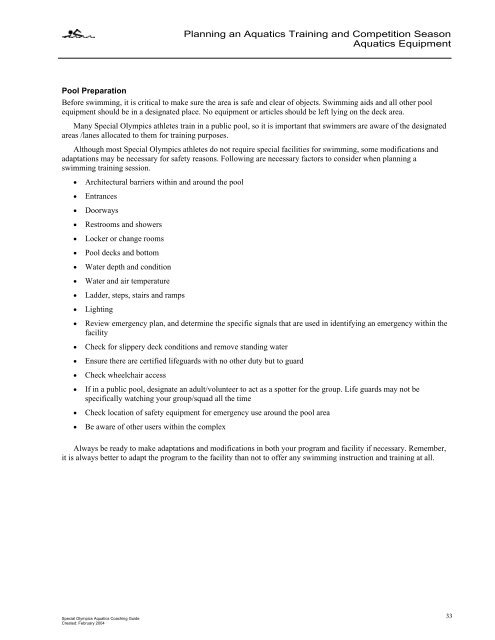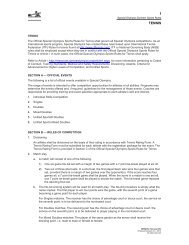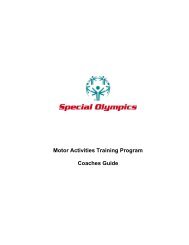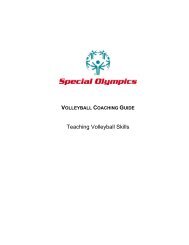- Page 1 and 2: AQUATICS COACHING GUIDE
- Page 3 and 4: Special Olympics Aquatics Coaching
- Page 5 and 6: Table of Contents Special Olympics
- Page 7 and 8: Individual Goal Setting and Evaluat
- Page 9 and 10: Assessing Goals Checklist 1. Write
- Page 11 and 12: Special Olympics Aquatics Coaching
- Page 13 and 14: Special Olympics Aquatics Coaching
- Page 15 and 16: Formation Circle Special Olympics A
- Page 17 and 18: Principles of Effective Training Se
- Page 19 and 20: Special Olympics Aquatics Coaching
- Page 21 and 22: Special Olympics Aquatics Coaching
- Page 23 and 24: Special Olympics Aquatics Coaching
- Page 25 and 26: Special Olympics Aquatics Coaching
- Page 27 and 28: Special Olympics Aquatics Coaching
- Page 29 and 30: Event: Insert Event Name Athlete’
- Page 31: Special Olympics Aquatics Coaching
- Page 35 and 36: General Swimming Equipment List At-
- Page 37 and 38: Table of Contents Coaching Swimming
- Page 39 and 40: Special Olympics Aquatics Coaching
- Page 41 and 42: Special Olympics Aquatics Coaching
- Page 43 and 44: Special Olympics Aquatics Coaching
- Page 45 and 46: Special Olympics Aquatics Coaching
- Page 47 and 48: Special Olympics Aquatics Coaching
- Page 49 and 50: Special Olympics Aquatics Coaching
- Page 51 and 52: Home Training Program Special Olymp
- Page 53 and 54: Table of Contents Skill Progression
- Page 55 and 56: Push and glide on front/back with a
- Page 57 and 58: Special Olympics Aquatics Coaching
- Page 59 and 60: Special Olympics Aquatics Coaching
- Page 61 and 62: Water Entry Water Entry from Sittin
- Page 63 and 64: Water Entry - Using a Ladder Specia
- Page 65 and 66: Water Exit Special Olympics Aquatic
- Page 67 and 68: Push and Glide Perform the Prone Fl
- Page 69 and 70: Special Olympics Aquatics Coaching
- Page 71 and 72: Games and Activities to Teach Basic
- Page 73 and 74: Teaching Point/Skill Special Olympi
- Page 75 and 76: Teaching Point/Skill Special Olympi
- Page 77 and 78: Teaching Point/Skill Forward Recove
- Page 79 and 80: Teaching Point/Skill Submerges into
- Page 81 and 82: Teaching Point/Skill Rolling Recove
- Page 83 and 84:
Teaching Point/Skill Sculling How F
- Page 85 and 86:
Sample Training Session Plan Form,
- Page 87 and 88:
Training Session Plan Form, page 2
- Page 89 and 90:
Aquatics Athlete Skills - Learn to
- Page 91 and 92:
Jumping Jumps in shallow water - as
- Page 93 and 94:
Push and Glide - Streamlined Positi
- Page 95 and 96:
AQUATICS COACHING GUIDE Teaching Aq
- Page 97 and 98:
Swimming Starts In-Water Starts Fre
- Page 99 and 100:
Skill Progression - Freestyle Speci
- Page 101 and 102:
Key Points - Down Sweep Hand sweeps
- Page 103 and 104:
Practice push and glide without flo
- Page 105 and 106:
Practice water drills for flutter k
- Page 107 and 108:
Special Olympics Aquatics Coaching
- Page 109 and 110:
Coaching Tips Special Olympics Aqua
- Page 111 and 112:
Teaching Timing Special Olympics Aq
- Page 113 and 114:
Special Olympics Aquatics Coaching
- Page 115 and 116:
Teaching Body Position Special Olym
- Page 117 and 118:
Coaching Tips Special Olympics Aqua
- Page 119 and 120:
Practice backstroke arm stroke on l
- Page 121 and 122:
Coaching Tips Special Olympics Aqua
- Page 123 and 124:
Coaches Tips for Backstroke - At-A-
- Page 125 and 126:
Special Olympics Aquatics Coaching
- Page 127 and 128:
Coaching Tips Special Olympics Aqua
- Page 129 and 130:
Practice the breaststroke arm strok
- Page 131 and 132:
Coaching Tips Special Olympics Aqua
- Page 133 and 134:
Coaching Tips Have the swimmer assu
- Page 135 and 136:
Skill Progression - Butterfly Speci
- Page 137 and 138:
Teaching the Butterfly - Arm Stroke
- Page 139 and 140:
Coaching Tips Special Olympics Aqua
- Page 141 and 142:
Coaching Tips Special Olympics Aqua
- Page 143 and 144:
Special Olympics Aquatics Coaching
- Page 145 and 146:
Swimming Starts There are basically
- Page 147 and 148:
Butterfly In-Water Start Coaching T
- Page 149 and 150:
Special Olympics Aquatics Coaching
- Page 151 and 152:
Freestyle Grab Start Teaching Point
- Page 153 and 154:
Breaststroke Dive Start Teaching Po
- Page 155 and 156:
Swimming Starts - Faults & Fixes Ch
- Page 157 and 158:
Freestyle Flip/Tumble Turn Hands do
- Page 159 and 160:
Teaching Backstroke Turns Practice
- Page 161 and 162:
Backstroke Tumble Turn Hands do not
- Page 163 and 164:
Butterfly and Breaststroke Pivot Tu
- Page 165 and 166:
Special Olympics Aquatics Coaching
- Page 167 and 168:
Training Session 1 Goal To introduc
- Page 169 and 170:
Backstroke Kicking Drills Kick on B
- Page 171 and 172:
Special Olympics Aquatics Coaching
- Page 173 and 174:
Coaching Tips Special Olympics Aqua
- Page 175 and 176:
Special Olympics Aquatics Coaching
- Page 177 and 178:
Training Session 5 Special Olympics
- Page 179 and 180:
Tumble Turn - Somersault Only Speci
- Page 181 and 182:
Backstroke Drills Special Olympics
- Page 183 and 184:
Tumble Turn - Roll Over Tumble Turn
- Page 185 and 186:
Training Session 6 Special Olympics
- Page 187 and 188:
Special Olympics Aquatics Coaching
- Page 189 and 190:
Training Session 7 Special Olympics
- Page 191 and 192:
Training Session 9 Goal To introduc
- Page 193 and 194:
Special Olympics Aquatics Coaching
- Page 195 and 196:
Special Olympics Aquatics Coaching
- Page 197 and 198:
Special Olympics Aquatics Coaching
- Page 199 and 200:
Special Olympics Aquatics Coaching
- Page 201 and 202:
Training Session 12 Goal To introdu
- Page 203 and 204:
Training Session 13 Goal 1. To asse
- Page 205 and 206:
Training Session 14 Goal 1. To asse
- Page 207 and 208:
Butterfly Turn The butterfly turn i
- Page 209 and 210:
Training Session 16 Special Olympic
- Page 211 and 212:
Backstroke Makes an attempt to swim
- Page 213 and 214:
You have learned ALL the skills nee
- Page 215 and 216:
Table of Contents Sample Squad Trai
- Page 217 and 218:
Special Olympics Aquatics Coaching
- Page 219 and 220:
Special Olympics Aquatics Coaching
- Page 221 and 222:
Freestyle Lateral Drill Special Oly
- Page 223 and 224:
Special Olympics Aquatics Coaching
- Page 225 and 226:
Coaching Tips Keep arms straight, n
- Page 227 and 228:
Backstroke Shoulder Rotation Drill
- Page 229 and 230:
Coaching Tips Check that head posit
- Page 231 and 232:
Coaching Tips Special Olympics Aqua
- Page 233 and 234:
Breaststroke Leg-Kick Drill on Back
- Page 235 and 236:
Special Olympics Aquatics Coaching
- Page 237 and 238:
Special Olympics Aquatics Coaching
- Page 239 and 240:
Pull is finished with the hands pre
- Page 241 and 242:
Three-Week, Nine Session Workout We
- Page 243 and 244:
Week 1 - Session 3 Special Olympics
- Page 245 and 246:
Week 2 - Session 5 Special Olympics
- Page 247 and 248:
Week 3 - Session 7 Special Olympics
- Page 249 and 250:
Week 3 - Session 9 Special Olympics
- Page 251 and 252:
Week 1 Day 3 Land Warm-Ups (10 minu
- Page 253 and 254:
Week 2 Day 3 Land Warm-Ups Water Wa
- Page 255 and 256:
Week 3 Day 3 Land Warm-Ups Water Wa
- Page 257 and 258:
Week 4 Day 3 Land Warm-Ups Water Wa
- Page 259 and 260:
Week 5 Day 3 Land Warm-Ups Insure t
- Page 261 and 262:
Week 6 Day 3 Land Warm-Ups Water Wa
- Page 263 and 264:
Week 7 Day 3 Land Warm-Ups Water Wa
- Page 265 and 266:
Week 8 Day 3 Land Warm-Ups Water Wa
- Page 267 and 268:
Special Olympics Aquatics Coaching
- Page 269 and 270:
Table of Contents Teaching the Rule
- Page 271 and 272:
Special Olympics Aquatics Coaching
- Page 273 and 274:
Aquatics Glossary Term Definition A
- Page 275:
Term Definition Special Olympics Aq
















